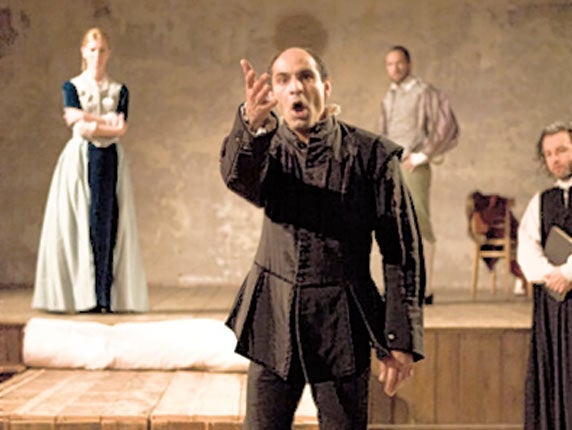Into Thy Hands, Wilton's Music Hall, London

When a play is described as "unashamedly literary", it is often polite code for "but dodgy as drama". This, though, is emphatically not so in the case of Into Thy Hands, Jonathan Holmes's passionately intellectual play about the metaphysical love poet and, later, Dean of St Paul's, John Donne. His play is additionally to be applauded because it shows off the architectural beauty and versatile viability as a performance space of Wilton's Music Hall, the oldest such venue in the country and one which is now in danger of closure after the Heritage Lottery Fund rejected its recent bid for £2.25m to make the building structurally sound.
Like Peter Brook's gem of a theatre in Paris, the Bouffes du Nord, Wilton's thrillingly conflates the sacred and profane, oddly resembling a place of worship as well as of vaudeville pleasures. This double-natured aspect suits the current play – in which Donne eloquently argues that the divine can only be apprehended and understood through the carnal medium of the body – down to the ground. In the author's own unforced, compelling production, an ecclesiastic shadowiness is imparted over the proceedings by Filippo de Capitani's lovely atmospheric lighting. Lucy Wilkinson's spare design is surmounted by an incense-dispensing thurible and an orrery or mechanical model of the solar system, then – as we learn in the play – the subject of much bitter and dangerous dispute.
Zubin Varla's excellent performance presents Donne as a charismatic visionary and voluptuary, fervent in his arguments against the flesh-hating preacher Lancelot Andrewes (Nicholas Rowe). You can believe that this figure translated Galileo, composed the love poems and acted as advisor on the translation of the erotically charged Song of Songs for the King James Bible. Concerned with how Donne in his "Croydon crap hole" survived poverty, lack of preferment because of his Catholic background and a loving marriage (to Jess Murphy's beguiling Ann) that was nonetheless career suicide, the play makes up for what it lacks in forward drive in the rueful humour and pained insight with which it treats his relationships with female lovers and female patrons and clerics appalled that he wants to use the word "ravish" in the Song of Songs. The dialogue is an adroitly inflected mix of the Jacobean and the modern.
To 2 July (020 7702 2789)
Subscribe to Independent Premium to bookmark this article
Want to bookmark your favourite articles and stories to read or reference later? Start your Independent Premium subscription today.

Join our commenting forum
Join thought-provoking conversations, follow other Independent readers and see their replies